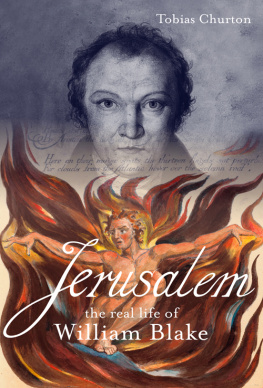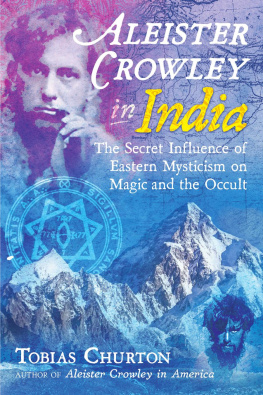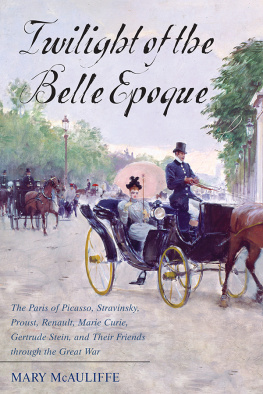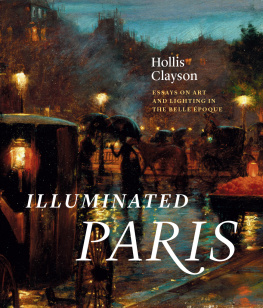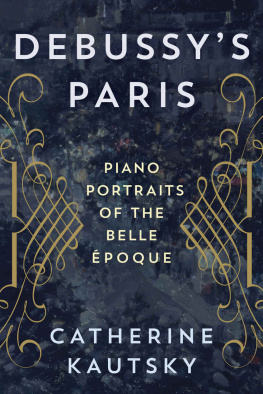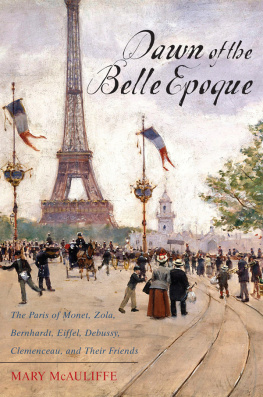Tobias Churton - Occult Paris: the lost magic of the Belle Époque
Here you can read online Tobias Churton - Occult Paris: the lost magic of the Belle Époque full text of the book (entire story) in english for free. Download pdf and epub, get meaning, cover and reviews about this ebook. City: France;Paris, year: 2016, publisher: Inner Traditions;Bear & Company, genre: Detective and thriller. Description of the work, (preface) as well as reviews are available. Best literature library LitArk.com created for fans of good reading and offers a wide selection of genres:
Romance novel
Science fiction
Adventure
Detective
Science
History
Home and family
Prose
Art
Politics
Computer
Non-fiction
Religion
Business
Children
Humor
Choose a favorite category and find really read worthwhile books. Enjoy immersion in the world of imagination, feel the emotions of the characters or learn something new for yourself, make an fascinating discovery.

- Book:Occult Paris: the lost magic of the Belle Époque
- Author:
- Publisher:Inner Traditions;Bear & Company
- Genre:
- Year:2016
- City:France;Paris
- Rating:4 / 5
- Favourites:Add to favourites
- Your mark:
- 80
- 1
- 2
- 3
- 4
- 5
Occult Paris: the lost magic of the Belle Époque: summary, description and annotation
We offer to read an annotation, description, summary or preface (depends on what the author of the book "Occult Paris: the lost magic of the Belle Époque" wrote himself). If you haven't found the necessary information about the book — write in the comments, we will try to find it.
Occult Paris: the lost magic of the Belle Époque — read online for free the complete book (whole text) full work
Below is the text of the book, divided by pages. System saving the place of the last page read, allows you to conveniently read the book "Occult Paris: the lost magic of the Belle Époque" online for free, without having to search again every time where you left off. Put a bookmark, and you can go to the page where you finished reading at any time.
Font size:
Interval:
Bookmark:
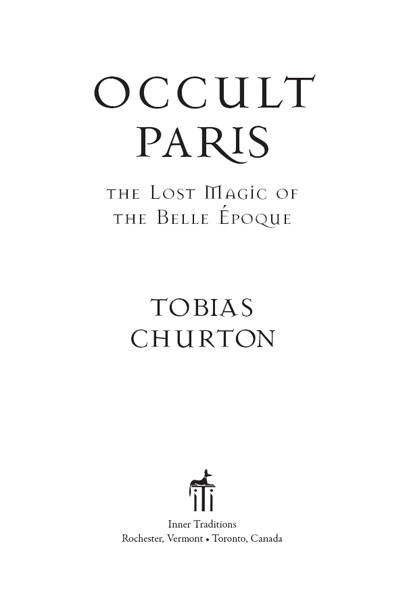
OCCULT PARIS

With Tobias Churton as the ciceroneor dare I say psychopomp?the reader is expertly guided in the labyrinthine world of the Occult Paris of the Belle poque (18711914). This is the best introduction to the French occult revival ever written in English.
HENRIK BOGDAN, PROFESSOR OF RELIGIOUS STUDIES AT THE UNIVERSITY OF GOTHENBURG
Music, art, literature, mysticismfin-de-sicle Paris had it all in great abundance, and in Tobias Churtons latest tome he uncovers the hidden and not-so-hidden connections between Satie, Debussy, Redon, Rops, Khnopff, Gauguin, Crowley, Lvi, Papus, Mathers, Pladan, Michelet, Blavatsky, Reuss, Huysmans, Breton, and countless others.... Eminently readable and filled with meticulous historical details, this is a fabulous depiction of one of the most exciting and fervent periods of creativity in modern times.
JOHN ZORN, COMPOSER-PERFORMER
A tour de force. A stunning account of fin-de-sicle Occult Paris and its lasting influence on the counterculture.... Churton gives comprehensive portrayals of such occult luminaries as Pladan, Papus, and de Guaita as well as a portrayal of their movements and a seminal analysis of esoteric artin particular the Rosicrucian art of the salonslocating its place in the intellectual, cultural, and political milieu of the Belle poque. Tobias is as erudite as he is excited and exciting. His scholarship is alive with passion, imagination, humor, and, most of all, humanity. A must-read for students of European history, Art Nouveau, Symbolism, Idealism, Surrealism, and the Decadents as well as for neo-Rosicrucian, Templar and Gnostic esotericists, and modern-day alchemists and magicians.
STEPHEN J. KING (SHIVA X), GRAND MASTER, ORDO TEMPLI ORIENTIS
No one can evoke the feel of a place and an era like Tobias Churton! This is Paris in the Belle poque, but behind the city of the can-can, Toulouse-Lautrec, and the Moulin Rouge, Churton shows us a Paris of seekers in mysterious worldsmagic, Hermeticism, Kabbalah, alchemyand of artists, writers, and composers who were also drawn to those realms. The spirit of their compelling quest is stamped on every page of this book.
CHRISTOPHER MCINTOSH, PH.D., AUTHOR OF ELIPHAS LVI AND THE FRENCH OCCULT REVIVAL
ACKNOWLEDGMENTS
Perhaps the greatest joy in researching and writing this book has been the opportunity to read many a forgotten text, practically all of which were written in the late nineteenth and early twentieth centuries, in French. In that sense, the bibliography constitutes the greater record of those whose assistance in composing this book has been invaluable. Some of these authors, thanks to the strength of their writing and skill in infusing their words with their minds and their hearts, have become to me something akin to personal friends. I felt this most strongly in the case of Victor-mile Michelet and Villiers de lIsle-Adam. I also felt something of the presence of Stanislas de Guaita and Josphin Pladan, whose parting was like the parting of Newman and Keble, among other spirits who must surely find friendships transcending time in the communion of saints that live for the guidance of those bound to earth. Thank you, old friends. Those who understand will not consider me presumptuous in this greeting.
I could not have accomplished this work without my teachers in French. I remember with great affection Nigel Crowther and Bernadette Thornton, as well as the tortures I inflicted on you during the long afternoons of high school. Wherever you are, however you are, you are dear to me, and the fruits of your tolerance are here to enjoy.
Frank van Lamoen and I have been friends now for thirty years: a little time really, but sufficient. As assistant curator of the Stedelijk Museum of modern and contemporary art, Amsterdam, Franks historical and bibliographical knowledge, and his willingness to assist has been a great boon. I join to my salutations to Frank, Cis van Heertum of J. R. Ritmans Bibliotheca Philosophica Hermetica, Amsterdam, for being such a friend to knowledge.
Acquisitions editor of Inner Traditions International, Jon Graham, was the first to seize on the value of this book, ensuring it would not remain a pipedream. Thank you, Jon, for your judgment is sure, and rare. What a blessing it is when the right man is in the right place: for such it is always the right time!
Many thanks are due to graphic designer (GRAPHYK), Paris habitu, and musician Jean Luke Epstein, who functioned as my Paris agent, obtaining information and images while I was waiting for an operation in May 2015.
Regular Skype conferences with artist and Western esotericist Vanilla Beer, now a longtime resident of southwestern Languedoc, and a light in the field, have proved both delightful and vital in drawing out issues and generating inspiration for this project. Vanilla was also on hand to scour the old bookshops of Carcassonne and Toulouse in search of elusive documentation. Thank you, Nil!
I must express my thanks to Pladan scholar and artist Sasha Chaitow, who, while I was in the process of researching Gnostic Mysteries of Sex, kindly sent me the following scholarly studies, all of them examining in depth and clearly revealing the philosophiesmost notably that of Platowhich imbued Pladans mind: chapter four of her Ph.D. thesis Redemption through the Arts: Josphin Pladans Platonic Legendarium (2014); her monograph Legends of the Fall retold: Pladans Luciferianism (Stockholm, Edda Press, 2013); and the papers How to Become a Mage (or Fairy): Josphin Pladans Initiation for the Masses (published in Pomegranate: The International Journal of Pagan Studies, XII, 2; 2012) and Hidden in Plain Sight: Josphin Pladans Religion of Art (published in Abraxas Journal Five (Deluxe Edition), Fulgur Ltd and Treadwells, 2014). Reading Chaitows analysis of Pladan helped to stimulate a powerful desire to get deeper into the authentic printed texts and, when occasion eventually presented itself, to make more intimate my acquaintance with the period.
Thanks also to my American friend, Theosophist Renate zum Tobel who has provided encouragement in difficult times and who has helped obtain antiquarian sources in the States surprisingly hard to obtain in England.
Last but by no means least, I wish to thank my old friend and colleague in the field, Dr. Christopher McIntosh, whose book liphas Lvi and the French Occult Revival (1972) long ago rekindled my fascination for the subject. His was a marvelous, pioneering English work, and if I have looked further, it is only because I have been permitted to stand on Chriss thankfully broad shoulders.
Ah! I have forgotten the most obvious source of inspirationwe always seem to forget what ought to be most obviousFrance herself! This book could not have been what it is but for the welcome I have received in France over the past forty years: memories flood in of sojourns in Paris, Carcassonne, Poitiers, Brittany, Chamonix, Strasbourg, Lyon, Montpellier, Avignon, Annecy, Angoulme, Nmes, Arles, Narbonne, Perpignan, Toulouse, Lamothe Fnelon, and of course the timeless countryside and villages of the Carcasss, the Lauragais, and the Arige. One cannot help wondering if France has not learned the wisdom of Victor-mile Michelet and decided to keep her light under a bushel. For the tourists, of course, theres the Louvre and the Tour Eiffel, which appropriately adorns the cover of this book. In this case, the artful cover is a coverthe true story lives within.
Chamonix Mont Blanc
And now away at last I find a town of the Belle poque,
Next pageFont size:
Interval:
Bookmark:
Similar books «Occult Paris: the lost magic of the Belle Époque»
Look at similar books to Occult Paris: the lost magic of the Belle Époque. We have selected literature similar in name and meaning in the hope of providing readers with more options to find new, interesting, not yet read works.
Discussion, reviews of the book Occult Paris: the lost magic of the Belle Époque and just readers' own opinions. Leave your comments, write what you think about the work, its meaning or the main characters. Specify what exactly you liked and what you didn't like, and why you think so.

